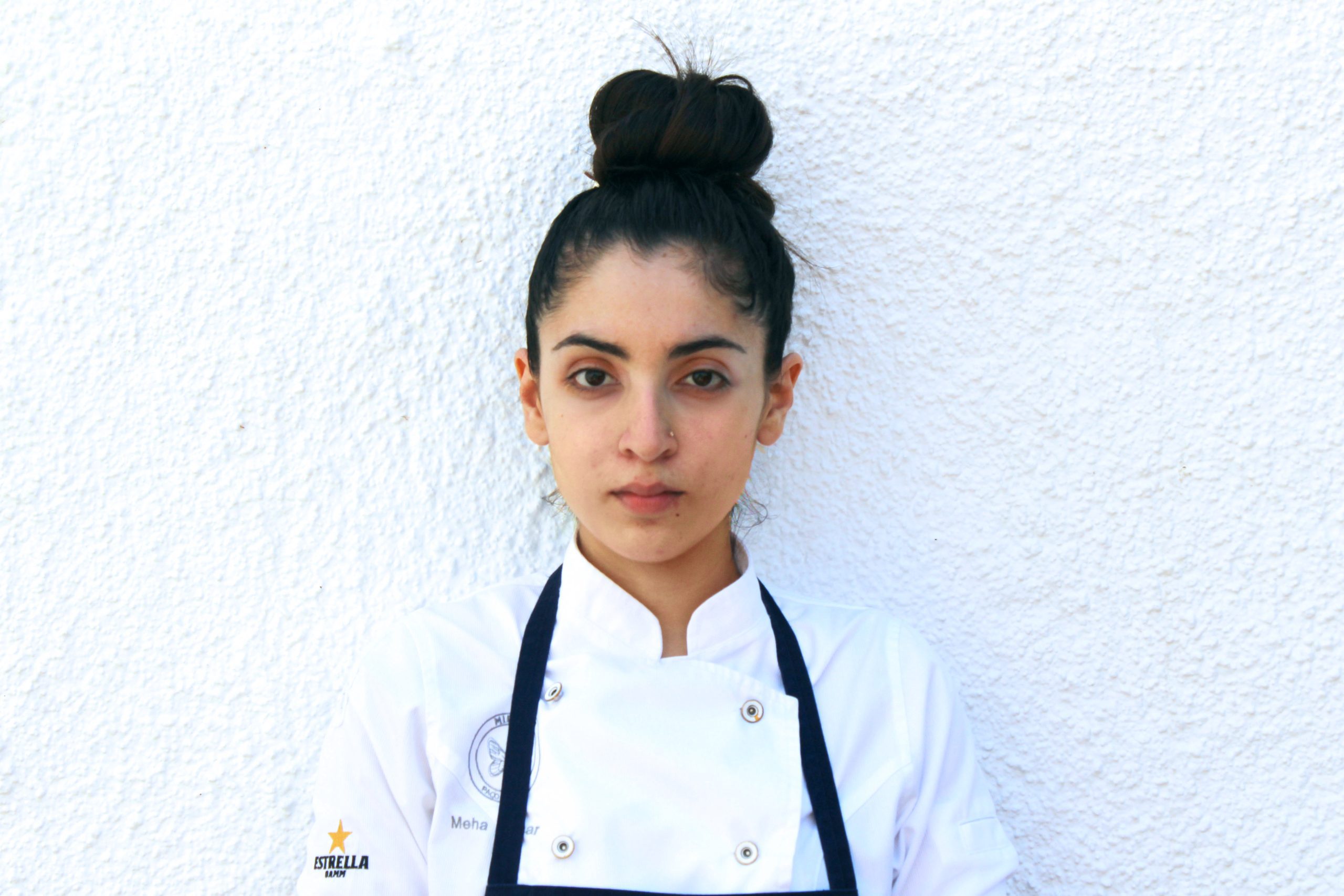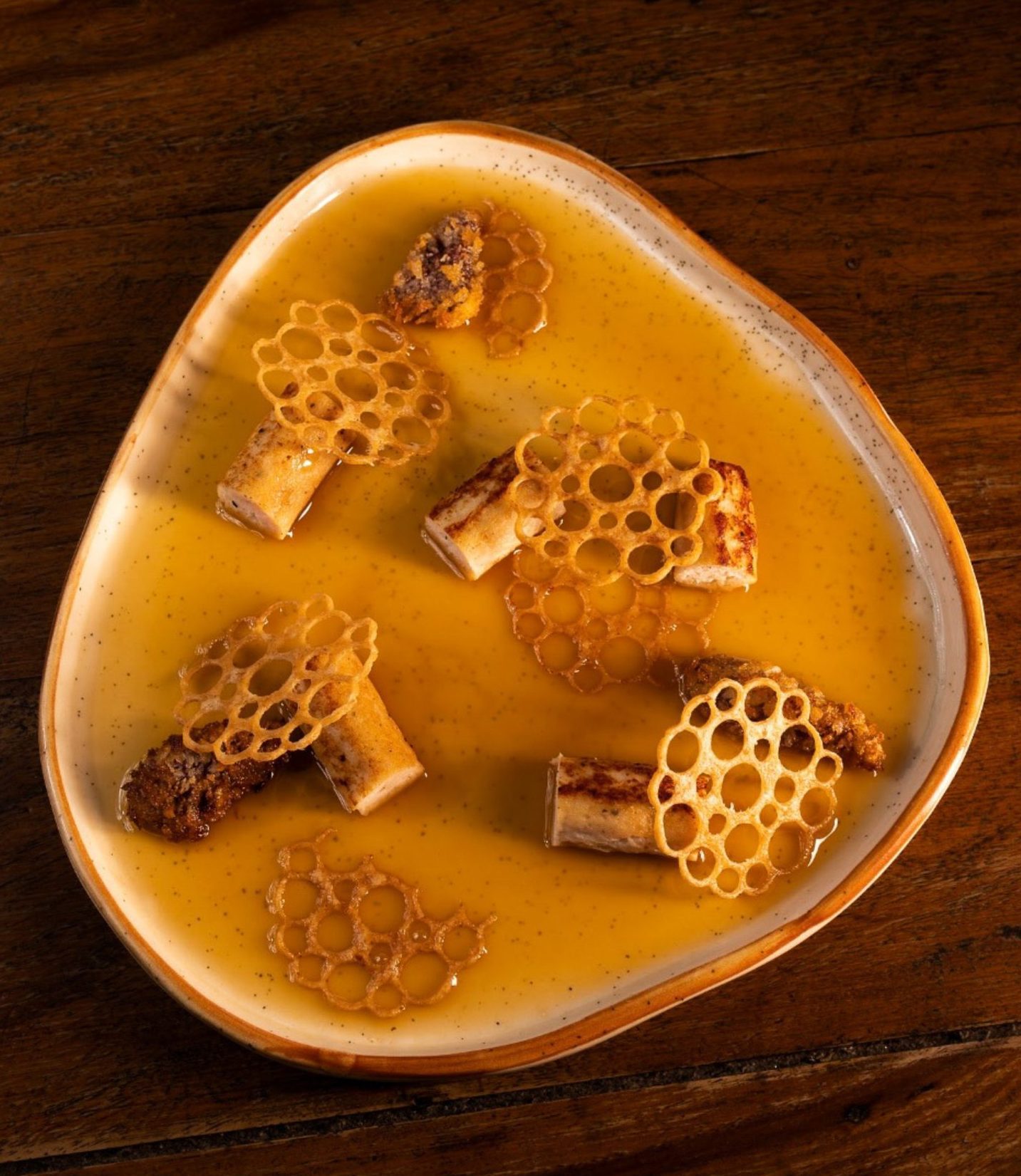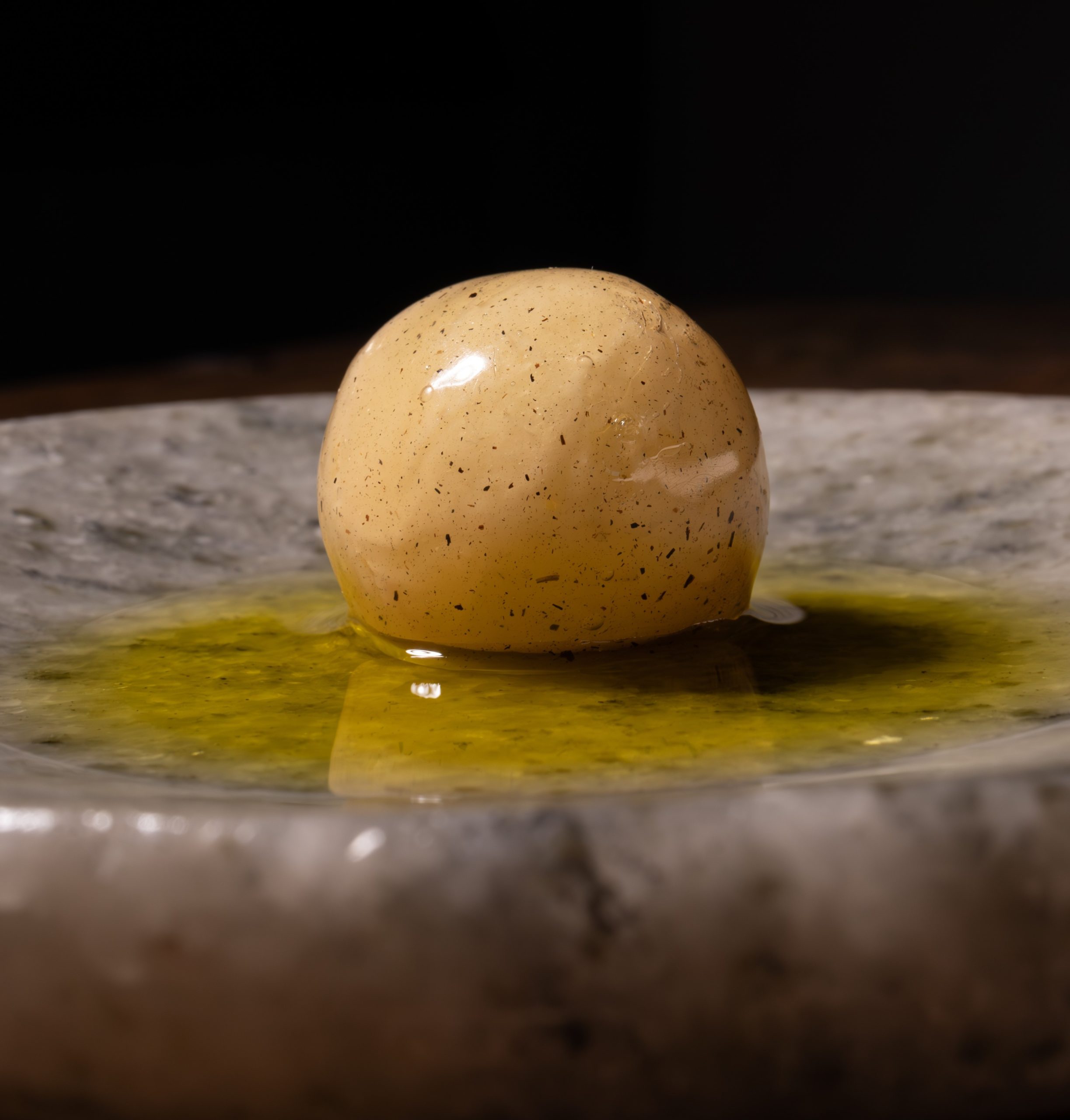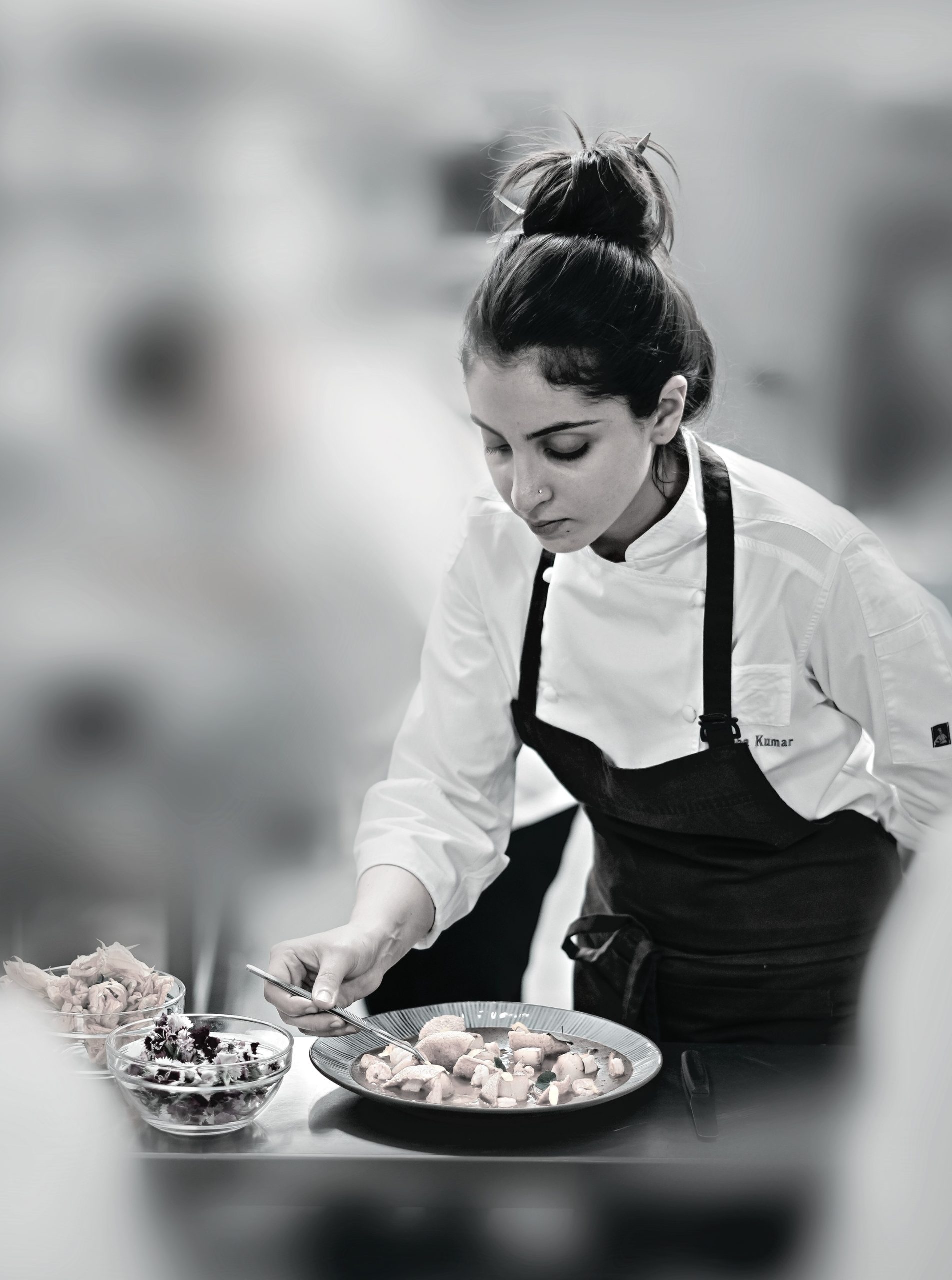The principle of umami or the fifth taste, focusing on a single ingredient, zero wastage and global influences make the food Chef Meha Kumar creates, truly original.
(September 24, 2023) Expected to follow the family tradition of studying medicine or engineering, Chef Meha Kumar decided to follow her passion and signed up for the four-year course at the Institute of Hotel Management, Aurangabad in 2012. When she realised that the focus was more on theory than practical in college, she decided to expand her horizons. In Hyderabad for a curated pop-up menu experience, she says in an exclusive interview with the Global Indian, “I was hungry to learn and in the second year, I started applying to hotels and Michelin-star restaurants. I didn’t want the campus placement offered by the Taj and Oberoi groups of hotels that happens in our third year. I got selected for an internship at the Ritz Carlton in Barcelona, Spain.”

Chef Meha Kumar.
Viva la Espana
The move to Spain truly changed the trajectory of Meha’s career and has shaped her philosophy towards food. Her personal worldview and work ethic make her an individual who is passionate about her work, but also a stickler for ethics and human decency. She says, “I was supposed to go to Spain for one year, but things kept progressing and I was there for eight years. I worked at the two-Michelin star restaurant called Enoteca in the Hotel Arts which is owned by Ritz Carlton; mentored by Chef Paco Perez. I also worked at the one Michelin star-rated Terra, another of his properties in Costa Brava, and at his restaurant Miramar in Llançà. Chef Perez is more than a mentor to me, he helped me with my craft, and it is from him that I learnt about commitment to sustainable cooking and zero wastage.”
All of 21, moving to a country where English wasn’t the chief spoken language, it was initially tough. “I landed in Barcelona with €250, not knowing a soul. In order to learn Spanish, I would listen to the radio on my daily 40-minute walk to work. In my free time, I watched the series Friends in Spanish with English subtitles. Today, when I go back to Spain, I have friends who are like family and a home to stay no matter where I am.”

Though Meha was admittedly in love with the country, she decided to return to India last year. “I had to step out of Spain because I felt it was time to start working on creating my own bubble. I set up my company, where I am a gastronomy consultant, and can develop restaurant concepts, develop menus and the nomenclature of menus. I do pop-ups pan-India. My company is called Linearé, which is the Latin word for linear. It reflects the essence of my work.”
Gourmet Art
Meha’s creations are artistic, colour-composite and unique. She followed the principle of umami or the fifth taste in her latest pop up in Hyderabad in collaboration with The Hedonist, a Pune-based company that curates fine food experiences. She explains, “There are four basic tastes – sweet, sour, bitter and salty. Umami is the fifth taste. Umami is chemically known as glutamate or MSG, but it is naturally present in fermented fruit and vegetables.”
Meha’s creations can transform the humble potato or musk melon to gourmet status. A potato dish has the translucent jellified membrane of the tuber speckled with onion ash and the inside of the globe is full of a French potato cream. A musk melon creation includes roasted seeds, leather of the peel and cured chunks of the fruit in sugar and ginger. For Meha, the main ingredient is always the protagonist on the plate. She believes it cannot be hidden under other elements like sauces or garnishes. “The minimalist approach is a play on simplicity because you have to know what you are eating.” She has curated menus where each course is dedicated to exhaustive utilisation of a single ingredient and there were ten such courses with ingredients as exquisite as black radish, globe artichokes and white asparagus, to the very simple ones like tomato, onion and cauliflower.

Meha’s potato dish which has a translucent jellified membrane of the tuber speckled with onion ash and a French potato cream filling inside.
Zero wastage is another of the foundations of her food. She says, “Chef Perez had extreme respect for the produce he used, and it resonated with me at a personal level. The best way to make food sustainable is to use all of it. The cost of food in any fine dining restaurant is at least 30-40 percent and by using everything, which is harder to do no doubt, instead of throwing it away, you make it sustainable. Even with root vegetables, soak them in water for a while, clean them well, roast and boil the peels of carrots or turnips with salt to make stock which can be the base of your soups.”
Mindful Eating
Are fine-dining pop-ups the new trend? And do such bite-sized portions truly make for a filling meal? She says, “There is a difference between filling and satisfying. When you have these dining experiences, you may not feel full, but you will finish your meal wanting a little more. I want to change the way people view fine dining; make it less intimidating and more approachable, where the diner takes away some learning from the experience. I interact with my guests and break down what I am serving so they understand the philosophy of the dish.”
Meha believes that these kinds of pop-ups are the future. “I think people should understand that it is beneficial to share knowledge and platforms. Restaurants need to keep reinventing so such pop ups help their image. Chefs too are able to innovate and display their creativity and it becomes a bigger, beneficial circle for everyone.”

Despite using global food influences to cook, the Global Indian favourite ingredients remain pepper, garlic, root vegetables, seafood, extra virgin olive oil and fresh chillies. And she claims she has a spiritual connection with artichoke. “In Spain, it was my first duty every day to cut the artichoke. It was a labour of love for me; the process of removing the leaves and fibres, the hair from the centre and then putting it in ice cold water with ascorbic acid. I had to do this daily for 40 of them. It was the time when I would be in the moment completely and gather myself for the day.” She also adds that seaweed as a flavour profile is extremely unutilised.
For someone still in her twenties to have created such a large volume of work is commendable. And she wants to continue pouring her passion into her beliefs about food in multiple forms.
Chef Meha eats at:
- Barcelona: Dahzong for authentic traditional Chinese
- El Pachuco, a Mexican bar for its cocktails like the Michelada
- San Sebastián: La Cuchara de San Telmo for its small hearty plates like pork cheeks.
- Follow Chef Meha on Instagram
